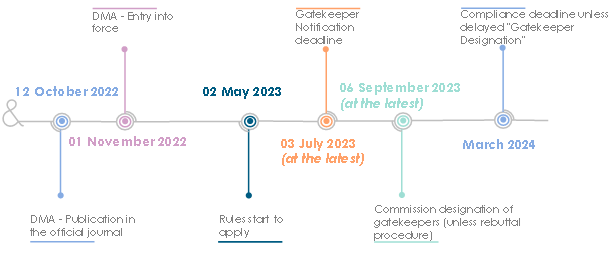The EU Digital Markets Act has entered into force – what are the next steps?

Link to original article:
https://www.twobirds.com/en/insights/2022/global/the-eu-digital-markets-act-has-entered-into-force
The EU Digital Markets Act (DMA) entered into force on 1 November 2022. The DMA is designed to address the challenges posed by digital markets and sitting alongside traditional competition law enforcement provides the European Commission with a new ex ante tool kit. The DMA will apply to designated “gatekeepers” who provide a range of “core platform services” (online intermediation services, search engines, social networks, video-sharing platforms, online communication services, operating systems, web browsers, virtual assistants, cloud computing services and online advertising services). More detail on the requirements is set out here.
Guidance and dialogue
The ink on the DMA is barely dry, but Commission officials are already working on procedural rules and guidelines. Specifically, the Commission is currently working on an implementing regulation which will address procedural aspects of notification, such as the format of notification, the right to be heard and the rebuttal of a gatekeeper presumption. The Commission aims to consult on the implementing regulation by the end of this year and adopt it in the first quarter of 2023.
In addition, the Commission is engaging with industry stakeholders to discuss the effective implementation of the DMA. It plans to organise technical workshops with interested stakeholders to obtain third party views on various implementation questions. The first technical workshop will take place on 5 December 2022 and will focus on the “self-preferencing” provision. Interested stakeholders can apply by clicking HERE.
Next steps and timeline for the DMA
The DMA will start to apply six months after its entry into force, i.e. by 2 May 2023. After this date, potential “Gatekeepers” – companies which have a market capitalisation of at least €75 billion (in the last year) or an annual turnover of €7.5 billion (in each of the last 3 years) and have at least 45 million monthly end users in the EU and 10,000 annual business users (over the last 3 years) - will have to notify their core platform services to the Commission within two months (by 3 July 2023). The Commission will then assess within 45 working days whether the undertaking in question meets the thresholds and shall designate gatekeepers by 6 September 2023 at the latest. Following their designation, gatekeepers will have six months to comply with the DMA’s requirements, i.e., by early 2024.

In exceptional circumstances, an undertaking providing core platform services can seek to rebut the presumption that it has a significant impact on the internal market by demonstrating that - although it meets the quantitative thresholds set out in the DMA - it does not fulfil the requirements for designation as a gatekeeper. If the arguments submitted are insufficiently substantiated because they do not manifestly put into question the presumption, the Commission can reject the arguments within the 45 working days provided for designation. Where the undertaking puts forward sufficiently substantiated arguments manifestly putting into question the presumption, the Commission may commence a short market investigation to inform its decision on whether to designate the undertaking as a gatekeeper. The Commission shall strive to conclude such a market investigation within five months. The Commission also encourages potential gatekeepers to submit draft notifications at the beginning of 2023 to enable meaningful pre-notification talks. The gatekeeper designation process will be first opportunity to test the new regime.
Enforcement
Pursuant to the DMA, the Commission will be responsible for enforcement working in close co-operation with the national competition authorities in EU Member States. Within the Commission, enforcement of the DMA will be shared between the Commission’s departments for competition (DG Competition) and tech policy (DG Connect).
The Commission is currently in the process of assembling a new Unit within DG Competition with new officials working on the DMA implementation and enforcement phases. This new Unit is expected to bring together two teams: a Unit working on digital markets and the existing DMA task force. DG Competition is expected to look at the majority of the enforcement cases, building on the existing structures for competition cases within the department. DG Connect may focus instead on interoperability issues, and disputes between publishers and search engines.
We can expect both robust enforcement by the Commission as well as significant scrutiny of the detailed DMA requirements by impacted companies. Non-compliance with the DMA will likely result in fines of up to 10 percent of their total worldwide annual turnover; this could rise to 20 percent in the event of repeated infringements. In case of systematic violations, the Commission could also impose so-called “structural remedies”, which could potentially force a break-up of companies.
What is clear is that Commission is strengthening its expertise and stands ready to use its new powers.

Any information given in this post concerning technical legal or professional subject matters is for guidance only and does not constitute legal or professional advice. Always consult a suitably qualified lawyer on any specific legal problem or matter. Bird & Bird assumes no responsibility for such information contained in this post and disclaims all liability in respect of such information.
本文中提供的技术、法律或专业事项相关信息仅供参考,不构成法律或专业意见。如有任何具体法律问题或事项,请咨询具有适当资质的律师。鸿鹄对于本文中的信息不负任何责任,并且不承担该等信息引起的任何责任。







